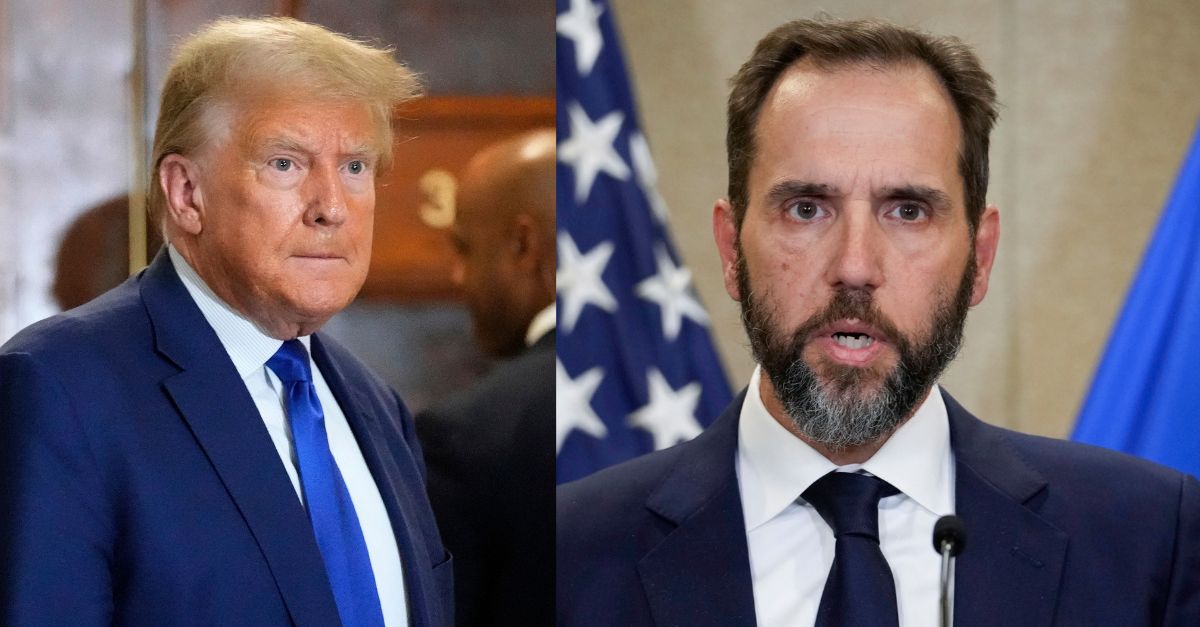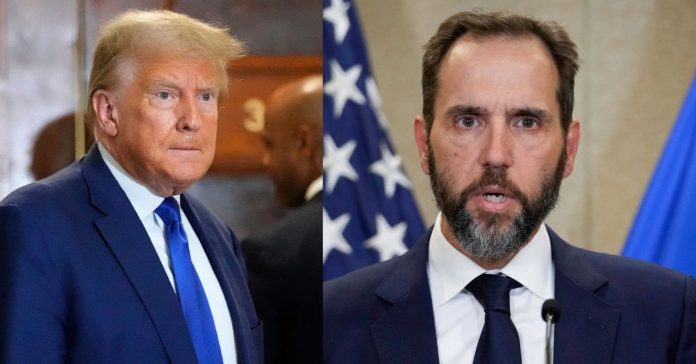
Left: Former President Donald Trump speaks during a break in his civil business fraud trial, Oct. 25, 2023. (AP Photo: Seth Wenig). Right: Special counsel Jack Smith speaks to the media about an indictment of former President Donald Trump, Aug. 1, 2023. (AP Photo: J. Scott Applewhite.)
Former president Donald Trump on Wednesday filed long-anticipated reply briefs arguing why the charges against him should be dismissed in the Mar-a-Lago classified documents case.
In two separate filings, attorneys representing the 45th president again asked U.S. District Judge Aileen Cannon to drop the charges.
The briefs direct their focus on recent arguments against dismissal made by special counsel Jack Smith – and come on the eve of a hearing in southern Florida dedicated to hashing out those issues.
Unconstitutional Vagueness
In their February motion to dismiss on vagueness, defense lawyers argued 18 USC § 793(e) – the Espionage Act statute, which forms the basis of the first 32 counts in the superseding indictment – has long been considered somewhat legally problematic, resulting in numerous courts that have “endeavored to ‘save’ the statute.”
“Those claims are unfounded,” Smith argued in the government’s opposition motion last week.
Trump’s Wednesday filing accuses the government of conceding that “judicial gloss” is necessary to make the Espionage Act claims work against the former president. The defense claims this is little more than evidence that prior courts have gone beyond the text of the law to “save statutes that Congress should have written more clearly.”
“The Special Counsel’s Office starts out with the baseless and untenable claim that the ‘statute’s prohibitions are clear,”” the Wednesday defense filing reads. “Perhaps what the Office meant—and this would be closer to the truth—is that courts facing inapposite factual circumstances have tried to make § 793(e) clearer through ‘explicat[ions]’ and ‘many judicial decisions’ that have broadened the statute’s scope beyond the plain meaning of the text Congress chose.”
Trump claims three phrases are vague: (1) “unauthorized possession”; (2) “relating to the national defense”; and (3) “entitled to receive it.”
In each instance, the defense argues, Smith’s office has mangled case law, intentionally made things up, and/or relied on non-circuit precedents that are the result of judges’ acting out of turn.
Trump says the government “wholly mischaracterized” a case that was about “classical spying” and not about document retention – making that case “irrelevant” to Smith’s claims that there was “clarity” about what “unauthorized possession” means in the present context.
The government previously argued: “Dictionary definitions establish that ‘unauthorized’ means without official approval or permission.”
Trump disputes this definition by noting that another case cited by the government was about receiving private documents “without permission.” He counters the government by saying Smith’s office “forced the word ‘official’ into their made-up definition.”
“The cobbled-together attempt by the Special Counsel’s Office fails as applied to President Trump,” the first filing argues. “As the Court already observed, President Trump was ‘once the country’s chief classification authority.’ He occupied that role as to each of the documents at issue in Counts 1–32.”
For the “national defense” (NDI) issue, Trump simply asks Cannon to ignore how many other courts have broadened the term.
“The ‘judicial interpretations’ identified by the Special Counsel’s Office do not, in fact, ‘narrow and clarify the text of the NDI Clause,” Trump’s attorneys argue. “Instead, these decisions impermissibly increased the scope of the statute in a manner that cannot be condoned.”
The ex-president’s defense attorneys also say the “entitled to receive” language in Section 793 (e) is vague in this case specifically because Trump designated all the documents in question as his “personal records” subject to the Presidential Records Act (PRA).
“The issue is that § 793(e) offers no clarity regarding who is entitled to receive’ a former President’s personal records under the PRA, pursuant to designations covered by presidential immunity, which are also subject to invocation of the executive privilege,” the first Wednesday filing argues.
This line of argument feeds directly into the second defense filing submitted to the court on Wednesday afternoon.
The PRA
The sum and substance of the second defense filing boil down to claims that Trump was president when he moved the documents from the White House to Mar-a-Lago and that he used the authority of the PRA to render those documents his “personal records.”
Last week, Smith argued that Trump’s reliance on the PRA to dismiss the entirety of the indictment was “fundamentally wrong.”
The special counsel’s office accused the defense of “alchemy” and argued that executive order 13526 — “in force throughout Trump’s Presidency and through the allegations in the Superseding Indictment” — states that classified materials “can be accessed only by a person who an appropriate United States official determines is eligible for such access; who has signed an approved non-disclosure agreement; and who has a ‘need to know’ the classified information.”
Trump directly addresses the alchemic argument – saying this is the only interpretation that actually makes sense.
“President Trump’s designation of records as ‘personal’ under the PRA by allegedly removing them from the White House while acting as President is not the product of ‘alchemy,” the second Wednesday defense filing reads. “Rather, this is the only fair inference from the Office’s allegation in the Superseding Indictment that President Trump ’caused’ boxes ‘to be transported’ to Mar-a-Lago at a time when he was still President.”
Trump’s attorneys also address Smith’s reliance on the executive order – saying there is simply no reason for the court to apply its classification scheme to the documents found at Mar-a-Lago.
“Executive Order 13526 does not—and cannot—override the PRA,” the second Wednesday defense filing goes on.
First, Trump notes, an executive order is inferior to a statute. Second, the defense argues, the specific executive order only mentions “presidential records” but not “personal records” under the PRA.
“So Executive Order No. 13526 does not address, much less refute, President Trump’s argument regarding his PRA designations,” the defense filing goes on. “The suggestion by the Special Counsel’s Office that President Trump’s designations of the records is implausible does not stand to reason.”
The entirety of the indictment – even beyond the Espionage Act charges – should also be dismissed because the concomitant criminal referral by the National Archives was premised on actions that were not crimes, the defense argues. The brief goes on to say the criminal referral was, therefore, an improper agency action.
Have a tip we should know? [email protected]

